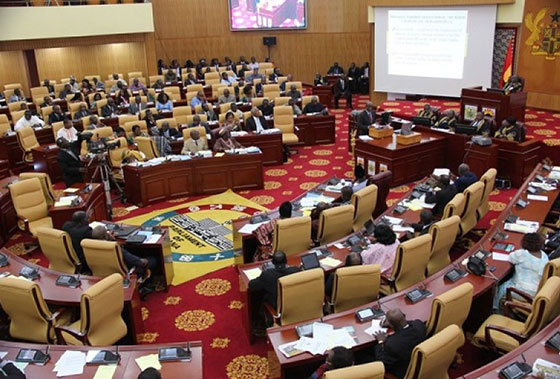National Development Planning Commission
National Development Planning Commission
The National Development Planning Commission (NDPC) was established under Articles 86 and 87 of the 1992 Constitution as part of the Executive.
The National Development Planning Commission Act, 1994 (Act 479) and the National Development Planning (System) Act, 1994 (Act 480), provide the core legal framework for the establishment of the Commission and the performance of its functions.
Our mandate is backed by the legal framework of NDPC which consists of the following:
An authoritative planning body providing sound policy choices for sustainable and even development of Ghana.
The Mission of NDPC is derived from its mandate which is to advise the President of the Republic of Ghana (and Parliament on request) on national development planning policy and strategy by providing a national development policy framework, preparing and ensuring effective implementation of approved national development plans and to coordinate economic, and social activities country-wide in a manner that will ensure accelerated and sustainable development of the country to promote continuous improvement in the living standards of all Ghanaians.
The core functions of the Commission established by Act 479 are:


1980
In the 1980s, as Ghana intensified the process of Decentralisation, the Government recruited a team of Hungarian consultants (TESCO), sponsored by UNDP, to study and propose a structure for national development planning based on grassroots participation. The resulting proposal from TESCO was considered at a high-level workshop in March 1987 after which a decision was taken to establish a development planning agency separate from the then Ministry of Finance and Economic Planning.
1979
The 1979 Constitution (Article 73) was the first to propose the establishment of a National Development Commission under the chairmanship of the Vice President, the first such constitutional provision in Ghana’s history. The Commission, through the Vice President, was to report to the President and had an advisory, monitoring, and evaluation role. The coup of December 1981 ended the existence of that Commission.
1987
In September 1987, the PNDC government announced the establishment of the National Development Planning Commission.
1989
A preparatory committee, the Transitional Implementation Team (TIT), was accordingly set up to manage the establishment of the Commission. The TIT drew up detailed proposals for the organization and structure of the Commission and prepared an interim operating manual. The Team also prepared a draft "National Development Planning Law" as the legal basis for the Commission. The draft law underwent a number of revisions and was accepted by the government in 1989 but was not immediately promulgated.
1990
In early 1990, the government decided to proceed administratively with the implementation of the TIT's recommendations A Preparatory Committee (PREPCOM) for the establishment of NDPC was thus set up under the chairmanship of Lieutenant-General Arnold Quainoo, a member of the PNDC. The Commission began operations at Flagstaff House, Accra, on 2 April 1990.
1992
With the change from military to constitutional rule in 1993, the Commission’s legal status was affirmed by Article 86 of the 1992 Constitution, which formalised the establishment of the Commission, and Article 87, which spelt out the Commission's functions, including the mandate to "advise the President on development planning policy and strategy”
1994
In September 1994, the National Development Planning Commission (NDPC) Act, (Act 479), was promulgated in accordance with the 1992 Constitution. Lieutenant-Colonel Mensah K. Gbedemah, who had been the secretary to the PREPCOM from February 1991 to June 1994, was appointed technical head of NDPC. From June 1994 to February 1995, Dr. Kobena G. Erbynn, a university lecturer, replaced Lt.-Col. Gbedemah.
1995
On the basis of the Act, in February 1995, a Governing Board of the Commission was established, replacing the interim management and board. On 15 June 1995, President Jerry John Rawlings officially swore in the first generation of members of the Commission at the Castle, Osu. Among the leading members were: Mr. Paul Victor Obeng (Presidential Advisor on Governmental Affairs) as Chairman; Prof. E.A. Boateng (former Head of the Environmental Protection Council and former Vice-Chancellor of the University of Cape Coast) as Vice-Chairman; and Dr. Kobena G. Erbynn as Acting Director-General of NDPC. Lt.-Gen. Arnold Quainoo stayed on as a member of the 35-member Commission.
2002
On February 7, 2002, President J.A. Kuffour after taking over the reigns of government from President J. J Rawlings, inaugurated, the second governing board of NDPC. Since then, NDPC has had three more governing boards being sworn into office under different Presidents. These are: 2010 – Third Governing Board of NDPC was sworn into office by President J.E.A Mills. 2015 – Fourth Governing Board of NDPC sworn into office by President J.D. Mahama. 2018 – Fifth Governing Board of NDPC sworn into office by President Nana Addo Dankwa Akufo- Addo.
#13 Switchback Road,
P. O. Box CT 633,
Cantonments, Accra - Ghana
Digital Address | GA-147-0671
Monday -Friday : 8am - 5pm
The National Development Planning Commission (NDPC) was established under Articles 86 and 87 of the 1992 Constitution as part of the Executive.